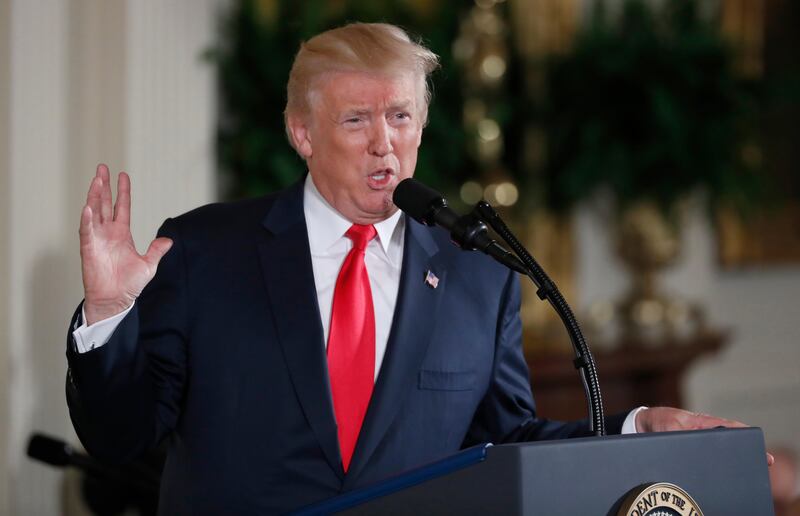US President Donald Trump upended the last eight years of the carefully crafted US diplomatic approach toward Iran, and delivered a fiery speech decertifying the nuclear deal and threatening to “terminate” it, as the US Treasury department designated Iran’s revolutionary guards corps under 13224 for supporting terrorism.
Mr Trump’s speech on Iran on Friday was leveled against the regime’s actions regionally and domestically as much as it was against the nuclear deal, a correlation that marks a departure from the Barack Obama approach. The US President laid an argument against Iranian behavior and what he called flaws in the JCPOA to announce “that we cannot and will not make this certification.”
While directing Congress to seek a legislation that would strengthen the deal in the next 60 to 90 days, that would later be negotiated with US allies, Mr Trump said failure to do so could result in US termination of the deal reached in 2015. “In the event we are not able to reach a solution working with Congress and our allies, then the agreement will be terminated” he said. “Our participation can be cancelled by me, as President, at any time.”
Read more:
[ Rouhani fires back at Trump, says Iran is committed to deal ]
[ Why Donald Trump is prepared to ditch the Iran nuclear deal ]
The US President launched a war of words in addressing the Iranian government. Calling the regime “rogue”, “fanatical”, “dictatorship”, he labeled it as “the world’s leading state sponsor of terrorism", and accused it of providing "assistance to al Qaeda, the Taliban, Hezbollah, Hamas, and other terrorist networks.”
Mr Trump recounted a chronoligical timeline of hostility and “aggression” from Tehran toward the US and regionally since the Islamic Revolution in 1979. From the US embassy hostage crisis in Tehran that year, to the Marines and embassy bombings in Beirut in 1983 and 1984, to the Khobar bombing in Saudi in 1996, Mr Trump accused Iran of being directly or through proxies involved in these attacks.
The US President went as far as accusing Iran of harboring "high-level terrorists in the wake of the 9/11 attacks, including Osama bin Laden's son."
He also accused Tehran of fueling "sectarian violence in Iraq, and vicious civil wars in Yemen and Syria." "Given the regime's murderous past and present, we should not take lightly its sinister vision for the future" he said.
Mr Trump used what he saw as Iran's malicious behavior partially to discredit the deal, calling it "one of the worst and most one-sided transactions the United States has ever entered into."
"The nuclear deal threw Iran's dictatorship a political and economic lifeline...it gave the regime an immediate financial boost and over $100 billion dollars its government could use to fund terrorism" Mr Trump said.
Criticizing the short time frame of the deal (15 years), Mr Trump said “other countries, they think in terms of 100-year intervals, not just a few years at a time.”
Contrary to the IAEA assessment and that of his own Secretary of State Rex Tillerson who said Iran is "in technical compliance" of the deal, Mr Trump said "the regime has committed multiple violations of the agreement." "On two separate occasions, they have exceeded the limit of 130 metric tons of heavy water...the Iranian regime has also failed to meet our expectations in its operation of advanced centrifuges."
He added that the "Iranian regime has also intimidated international inspectors."
The US President after announcing that he will decertify the deal, took another escalatory measure in “authorizing the Treasury Department to further sanction the entire Islamic Revolutionary Guard Corps for its support for terrorism and to apply sanctions to its officials, agents, and affiliates.”
As Mr Trump was speaking, the Treasury department announced designating IRGC “pursuant to the global terrorism Executive Order (E.O.) 13224 and consistent with the Countering America’s Adversaries Through Sanctions Act” that was passed by Congress and signed into law last August. The statement accused IRGC of “providing support to a number of terrorist groups, including Hizballah and Hamas, as well as to the Taliban.” While the designation labels IRGC in its entirety for “supporting terror” it is not equivalent to labeling the group as foreign terrorist organization by the State Department. That label applies to Hizbollah and Al-Qaeda and ISIL but administration shied away from it due to “"particular risks and complexities to designating an entire army, so to speak, of a country” said Mr Tillerson.
Following the speech, Congress started working to draft a legislation with trigger points in an attempt to save the nuclear deal. Senate minority leader Chuck Schumer said in a statement that “President Trump’s own Secretary of Defense and Chairman of the Joint Chiefs of Staff, Generals Mattis and Dunford, both said that it’s in our national security interest to keep the JCPOA in place and I agree.” “I believe Congress, both Democrats and Republicans, will heed their recommendation.”
The House Foreign affairs committee welcomed the speech and said in a statement that it’s “committed to work with the President to address these flaws, hold Iran strictly accountable to its commitments, and support efforts to counter all the Iranian threats.”
(1/3) Ambassador Yousef Al #Otaiba: For many years, #Iran has been part of the problem, not part of the solution in the region.
— UAE Embassy US (@UAEEmbassyUS) October 13, 2017
UAE Ambassador to the United States, Yousef Al Otaiba welcomed Mr Trump speech said "For many years, Iran has been part of the problem, not part of the solution in the region." He added that Tehran "undermines regional security through supporting violent proxies, promoting sectarianism, and exporting its revolution."






